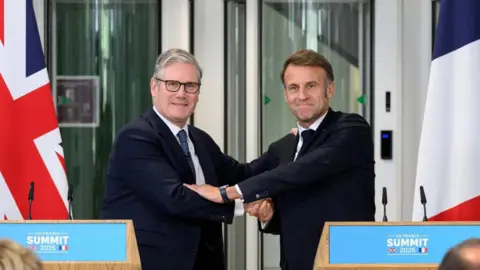In a recent press conference in July 2025, UK Prime Minister Sir Keir Starmer and French President Emmanuel Macron publicly called for patience in an increasingly impatient world, addressing growing concerns stemming from waves of populism in their respective nations. Both leaders are grappling with disapproval in the polls and the pressures of maintaining their political beliefs amid significant public skepticism towards traditional political institutions. Their significant yet nuanced discourse highlights the juxtaposition between the complex realities of political leadership and the increasingly simplistic appeals made by radical reformist groups gaining traction on both sides of the English Channel.
The stark reality this press conference illustrated was the delicate balance of ideals and responsibilities that leaders like Starmer and Macron must navigate as they advocate for patience, value nuanced approaches, and promote gradual change. They aim to convey that sophisticated political thought and processes are essential in addressing multifaceted societal issues, even as public dissatisfaction grows regarding perceived ineffectiveness from long-standing political establishments. Their comments were imbued with an understanding of a broader political landscape that has been increasingly hostile to traditional methods of governance.
During the conference, the overt references to two specific political movements—Reform UK in the UK and National Rally in France—were absent, yet their undercurrents heavily influenced the discourse. These parties, while not identical, amplify a discontent that resonates deeply with citizens who feel disillusioned and alienated by conventional politics. The absence of naming these parties did not minimize the palpable tension and the challenge that Starmer and Macron feel from these rising movements, which resonate with voters by espousing anti-establishment sentiments and employing straightforward communication styles that appeal to a populace craving representation and action.
Starmer specifically took the opportunity to criticize those whom he felt were merely documenting problems rather than addressing them—likely a nod towards critics such as Nigel Farage, the leader of Reform UK, who frequently disparages governmental approaches towards immigration and other pressing issues. Starmer emphasized the importance of pragmatic governance that eschews “the politics of easy answers,” pointing towards a more reasoned approach to politics—one that prioritizes long-term solutions over quick fixes. This reflects a strategic pivot in Starmer’s approach, targeting not just the policies of Farage but also the broader narrative around governance effectiveness.
Macron similarly voiced concerns regarding the populist movements in France, articulating the necessity to confront the “temptation” that arises from oversimplified political rhetoric that might mislead citizens, driving them away from the complexities that define modern governance. By intertwining their narratives, both leaders indicate their awareness of a shared struggle against those who cater to public frustrations with promises that lack substantive paths forward.
Polling data presented, highlighting that a significant number of Labour voters had switched their allegiance to Reform UK, underscores the urgency of the situation. Polls show that many voters would return to Labour if issues such as small boat crossings were addressed effectively. The dissatisfaction from constituents reveals a fracture in public confidence, indicating that Labour, despite its historic advantages, must confront rising anti-establishment sentiments with genuine reforms or risk further exodus of support.
The ramifications of these discussions extend to fears among leaders across both major political parties. There is a growing recognition of a potential Reform UK victory, sparking discussions on what such an outcome would mean for the British political landscape. As both Labour and Conservative figures expressed concerns over possible failures within their own parties, they recognized a landscape where being deemed ineffective could lead to a dramatic shift in political allegiance towards voices advocating drastic reforms.
In a period when the demand for quick fixes focuses debate around immediate concerns over nuance and pragmatism, Starmer and Macron’s call for patience presents a counter-narrative. It is clear that these leaders are advocating for an informed and involved electorate capable of understanding and tackling complex issues rather than succumbing to the allure of simplistic, populist solutions. This moment in political dialogue signifies not just a battle for numbers but for the very essence and vitality of modern governance against the rising tide of impatience and radical reform.











